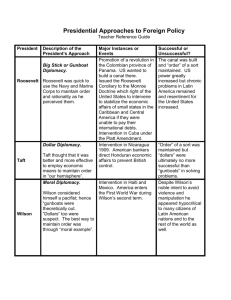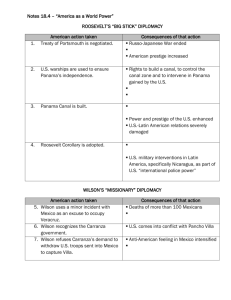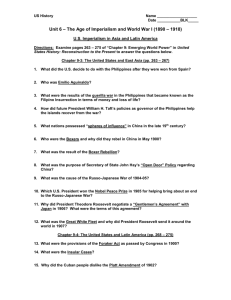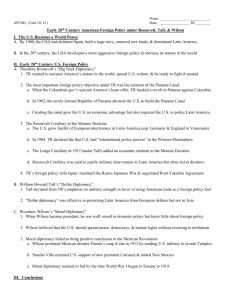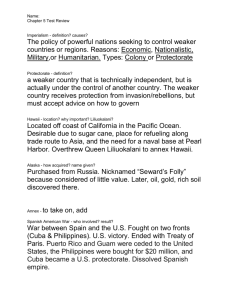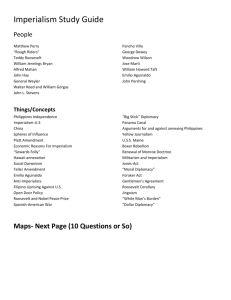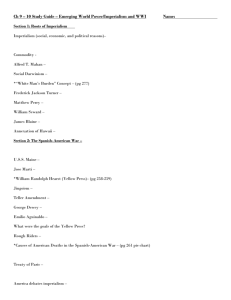File
advertisement
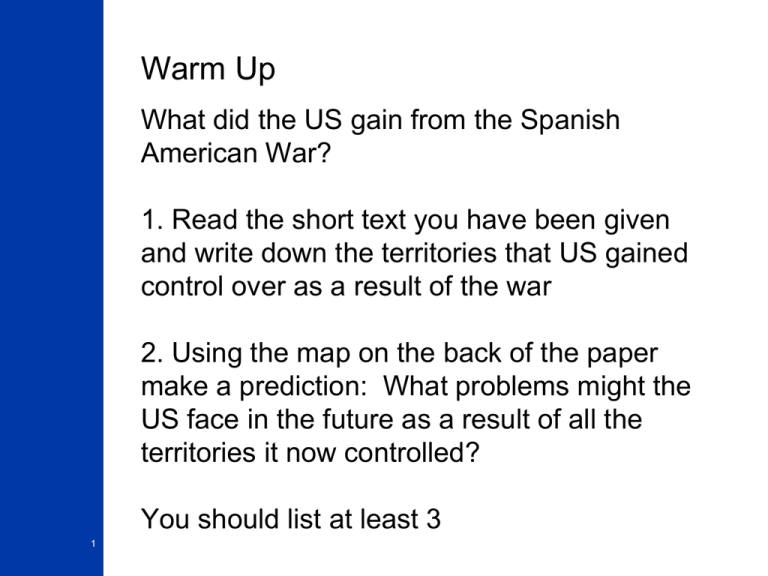
Warm Up What did the US gain from the Spanish American War? 1. Read the short text you have been given and write down the territories that US gained control over as a result of the war 2. Using the map on the back of the paper make a prediction: What problems might the US face in the future as a result of all the territories it now controlled? You should list at least 3 1 Agenda • Warm Up: What did we get from the war? Name the major events that put American on the world stage? Define the policies of 3 different US presidents? What were the cost and benefits of US foreign policy between 1890 & 1914? • HW collected • Presidents/Timeline • Spanish American War Review • Foreign Policy in Asia • Panama Canal 2 • 3 types of foreign policy “We assert that no nation can long endure half republic and half empire, and we warn the American people that imperialism abroad will lead quickly and inevitably to despotism at home” -Democratic National Platform (1900) Becoming World Power 1890-1914 Causes of Imperialism • E • m • P • I • R • E 4 Timeline of Presidents • ( R) William McKinley 1897-1901 (assassinated) –Spanish American War • (R) Theodore (Teddy) Roosevelt 1901- 1909 –Panama Canal • (R) William Howard Taft (1909-1913) • (D) Woodrow Wilson (1913-1921) –World War I 5 United States Foreign Policy 1890-1914 US Imperialism: Arguments for Expansion American Frontier Closed - US pioneer spirit looks towards foreign interests. Expand or explode Expand business interests-US economy boomed. Companies built overseas factories. Need new markets to prevent financial panics. Military interests–International competition for colonies would leave America behind. 1890 funding approved for 3 battleships (US becomes 2 ocean navy). International navy needs coaling ports. Social Darwinism- US must expand to survive. Whites are superior race. Must spread superiority 6 Spread Christianity-All nations should be What event sparked the war with Spain? 7 Teddy Roosevelt Speech “ To be prepared for war is the most effectual means to promote the peace” Is Roosevelt’s speech a convincing justification for war? Why? Write down your answer then turn and tell your partner 8 United States Foreign Policy 1890-1914 The Cuban Revolt: America to the Rescue? Cuba vs. Spain-Spanish rule oppressed the Cubans. Cubans revolt. Spain responds by sending General “Butcher” Weyler to crush the rebellion. Cuban rebels placed in concentration camps (many died due to poor sanitation). America Backs Cuba-Sentimental: Cuba was the underdog. Economic: American businesses traded $100 million/year. Political: Spain is a dying empire in America’s sphere of influence. Whoever controls Cuba controls a potential Panama Canal. 9 United States Foreign Policy 1890-1914 The Cuban Revolt: America to the Rescue? Yellow Journalism: The practice of exaggerating stories for political purposes, or to attract more readers Hearst vs. Pulitzer: 2 New York Newspaper owners competing for readers 10 Each paper exaggerated the reports on the atrocities in Cuba. United States Foreign Policy 1890-1914 America and the Philippines: $20 Million for a Rebellion? What to do with the Philippines-3 options. Give the islands back to Spain (misrule). Leave the islands and not give them any help (irresponsible and Germany or Japan would seize them resulting in another war). US annexation. McKinley opted for annexation (US Senate approved the treaty by one vote) Bitterness and Rebellion-Filipinos wanted independence. 126,000 US troops sent to fight rebellion against US. Results-Fighting lasts until 1902. 4,234 Americans killed. 600,000 Filipinos killed. Philippines not granted independence until July 4, 1946. 11 United States Foreign Policy 1890-1914 Just Say No To Empire: The Anti-Imperialist League Anti-Imperialist League was to fight the McKinley administration’s expansionist policies. Prominent leaders included Mark Twain and Andrew Carnegie. Anti-Imperialist Objections- •Declaration of Independence and the Constitution state it is the right of the people to choose their form of government. •Imperialism was against America’s anti-colonial policy. •Imperialism would be too costly. •Annexation would pull the US politically and militarily into Asia (okay to be pulled economically). 12 United States Foreign Policy 1890-1914 America in Asia: Japan Matthew Perry Opens Japan- US sent 4 nave ships in 1853 and negotiated trade agreement with Japan Results- -Japan begins to use western technology to build up their country -Japan begins to gain power and build up an Empire of their own in the Pacific What problems will this cause down the road for the US? 13 United States Foreign Policy 1890-1914 America in Asia: China and the Open Door Open Door Policy- European powers are competing for influence over China. The US convinces all of them to allow equal access to trade with the Chinese Boxer Rebellion-(1900) Super-patriotic group of Chinese trained in martial arts murdered foreigners and Christians. A multinational force (including American soldiers) stopped the rebellion. Results-Gave all nations equal trading access in China. Guaranteed that China would not be taken over by a foreign power. 14 United States Foreign Policy 1890-1914 American Power: Building the Panama Canal Background-US needs a two ocean navy to protect interests. Spanish-American war demonstrated the lack of mobility. Rights to the Canal-Hay-Pauncefote Treaty (1901). Authorized the US to construct and manage a Central American canal. The canal was to be open to all nations and rates to be fair and equal. (1902). Revolution-Panama was part of Colombia. Colombia rejected $10 million and $250,000/year. (1903) the US navy supported Panamanian revolt. US recognized independent Panama 3 days after revolt. Construction-(1904-1914). Cost $400 million. 15 Problems with labor, landslides, and disease. 4 Types of Foreign Policy • Read through the four types of policies • Complete the handout 16 United States Foreign Policy 1890-1914 Theodore Roosevelt’s Foreign Policy: Carry a Big Stick Roosevelt Corollary-Preventative intervention. US would intervene in Latin America to keep European powers out of the Western Hemisphere. Corollary Results-Used to justify all interventions. US Marines will be sent multiple times to Latin American countries. Latin American countries views this as American oppression. Roosevelt in Action-Roosevelt was not 17 afraid to flex American muscle. Roosevelt acted as mediator in Russo-Japanese War (won Nobel Peace Prize in 1906). Sent the US Navy to protect the Panamanian revolt (1903). (1907) ordered the Great White Fleet on highly visible voyage around the world (show off American naval power). United States Foreign Policy 1890-1914 William H. Taft’s Foreign Policy: Dollar Diplomacy Background-Federal government encouraged Wall Street bankers and other major US corporations to invest in foreign countries that were of a strategic concern to the US. The dollar would replace Roosevelt’s big stick. Dollar Diplomacy in the Caribbean-Main area of US strategic importance. US pumped money into this area to keep other countries out and to uphold the Monroe Doctrine. Policy failed when civil distress broke out in Cuba, Honduras, and the Dominican Republic. President Taft had to send in the Marines to protect American investments. 18 United States Foreign Policy 1890-1914 Woodrow Wilson’s Foreign Policy: Moral Diplomacy Background- •Wilson hated Roosevelt’s big stick and Taft’s dollar diplomacy. • Wilson believed that the US would be the world’s conscience. Goal of American foreign policy would be to spread democracy and promote peace. Wilson in Action-Sometimes spreading democracy required military action. Wilson sent the Marines to Haiti (1914-1933) and the Dominican Republic (1916-1924). (1916) Jones Act granted the Philippines territorial status and promised independence 19 United States Foreign Policy 1890-1914 Woodrow Wilson’s Foreign Policy: Moral Diplomacy America’s Mexican Adventure-American companies invested billions of dollars in Mexican oil, railroads, and mines. • (1913) Mexican people rebelled. •(1914) Wilson sent the Navy to capture the port of Vera Cruz. • (1916) Wilson ordered General Pershing to break up Pancho Villa’s group. • (1917) US withdrew because threat of war with Germany increased. 20 Exit Questions • What problems are associated with US Policies of imperialism? • What advantages/accomplishments came out of our policy of imperialism? • Does our policy of imperialism meet the ideals of the Declaration of Independence? 21 HW • Create Flashcards for the following words: Roosevelt Corollary, Dollar Diplomacy, Moral Diplomacy Panama Canal, Yellow Journalism, Open Door Policy, Anti-Imperialist League, Teddy Roosevelt, William Taft, Woodrow Wilson 22
